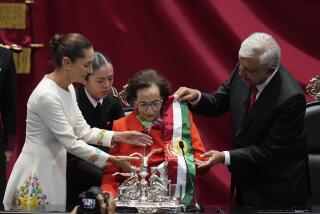Mexico’s First Lady Brings Plea for Latinos to Follow Traditions : Education: Cecilia Occelli de Salinas reviews instruction methods and facilities at Santa Ana’s Century High School.
SANTA ANA — “Bon jour!” the students shouted Friday as Mexico’s First Lady Cecilia Occelli de Salinas entered the Century High School classroom.
The scene with students in a French class offered a bit of irony for the visiting dignitary, who had come to the school to learn how the sons and daughters of Mexican immigrants are being educated in the United States.
What she saw was a multicultural, computer-linked learning program not available to students in her country.
“We do not have the economic power to have these types of schools in Mexico, but we are working so that the community can work to have this type of education,” Occelli de Salinas said during a brief press conference after touring the 3-year-old campus.
As part of a tour of Southern California this week--which included a visit to an East Los Angeles school, a stop at a public health clinic and a meeting with a Los Angeles group of Mexican-American women volunteers--Occelli de Salinas said she wanted to visit a Santa Ana school because of the district’s large Latino population.
Of the 2,200 students at Century High, 85% are Latino, school officials said.
Among the first to greet Occelli de Salinas when she arrived was the student body president, Edgar Munoz.
“I was born here in the United States, but my parents were born in Zacatecas,” Munoz told her in Spanish as he presented her with a bouquet of flowers.
As the First Lady was escorted across the school grounds by Principal Gerald W. Arreola, the school’s ballet folklorico danced “Redoba,” a polka from northern Mexico.
The First Lady said later that as Mexicans assimilate in a new country, they should not forget their culture.
“I would like to tell” the students that Mexicans wish them to “continue their traditions,” Occelli de Salinas said in Spanish.
“We have to work hard for the integration of the family, that the family continue functioning in this land,” she said. “It’s very important, because we will always have the help and support from the family first.”
While touring the classrooms, she told the students to keep working as she quietly asked questions of the principal in English.
“Do they have any knowledge (of computers) before they come in here?” she asked Arreola.
She learned that for most students, computers are a new basic skill taught to everyone.
During the press conference, Occelli de Salinas, 42, said she would tell her husband, President Carlos Salinas de Gortari, of the “wonderful things that are being done for the education of the people that need it the most.”
The First Lady also presented the school with a 200-volume set of encyclopedias and other books about Mexico’s history and culture.
Occelli de Salinas studied history, art history and business before obtaining a degree as a Spanish-English bilingual secretary at the Colegio de Cursos Culturales (College for Cultural Courses), according to her official biography.
As honorary president of a foundation in her country that guides the government’s social service policies, Occelli de Salinas has focused on education and on caring for children who have been abandoned by their families in Tijuana as their parents cross the border to seek jobs in the United States.
Temporary homes for adolescent girls are being set up in the Tijuana area, she said, “where they can live until they return to their states or join their families in the United States.”
Among the Santa Ana residents who met her were Emma Aragon and Emilia Palacios, members of the school’s bilingual advisory committee, who immigrated to the United States during the 1980s.
They were hosts for Occelli de Salinas’ 90-minute visit, which ended with coffee and cake.
“It was very beautiful for me to have her in this school,” Aragon said, adding that it was as exciting as if First Lady Barbara Bush had visited.
Palacios, a native of El Salvador, said she was equally impressed, even though she is from a Central American country, because Occelli de Salinas’ visit would help motivate Latino students.
“We are all alike,” she said. “We are brothers and sisters.”
More to Read
Sign up for Essential California
The most important California stories and recommendations in your inbox every morning.
You may occasionally receive promotional content from the Los Angeles Times.










